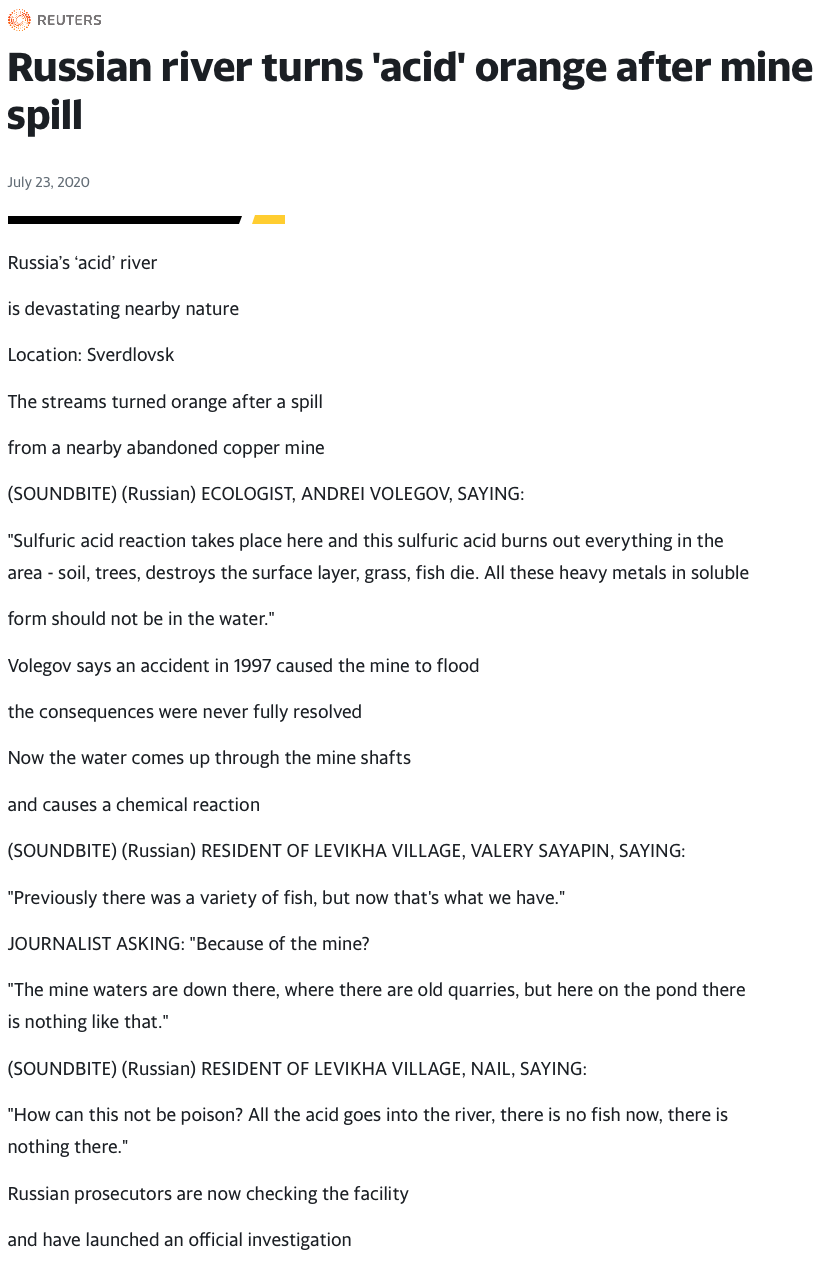“Can a half-page beat be condensed to a quarter-page? Can a ten-word line be trimmed to three words? … 3/8 of a page may seem insignificant, but Stoppard chips away at many moments throughout the script – a few lines here, half a page there – and the result is a hugely streamlined experience.”
Category: Obsessions
An interview with a tuna salad
In my mortal frailty, I am still known to frequent the social media platform “Instagram,” where daily I strive to evade a thicket of deceptions in vain labor to indulge my own voyeurism. Over time the adversarial servers marshaled there against me have determined that I will interact with their advertising metrics if they show me posts by a man named @tuna_salad_on_white. I no longer remember how we first encountered one another, but I do find his expressive taste and reserved captions welcome, as they constitute a fine astringent for my daily portion of social media slop.
Because Tuna—whose nom de loi is Andrew—has kindly responded to a few of my messages over the years, I thought I would press my luck and ask to know him better by way of an interview. Is this a thing I do on my blog now? I guess so! The following is haphazardly collaged from a brief series of emails, which I say because “edited for length and clarity” makes me sound much more professional than I am. Hyperlinks are my own; all photo credits to my interlocutor except the one I took.

I was going to ask you about whether you would consider yourself an aesthete, but then I looked up the word to make sure I was using it right, and it turns out it can mean either one who appreciates artistic qualities and beauty in all things OR someone who values the qualities of appearance in things above all else, including their function: which is to say I’m not sure what I would be implying if I led off with that. So, is Phantom Thread (2017) your favorite movie?
[Hits play on Philip Glass’s Music in 12 Parts, cracks knuckles, opens laptop]. So Brendan you’re coming in strong with that first one, let’s see if I can give an answer worthy of the question. I would say that instead of an aesthete, what I aim to be is an ascete, forever seeking to simplify my life to the essentials—cats, good food, a modicum of physical activity, human contact and art (and work on occasion of course to pay for all of that). Of course trying and succeeding are very different things.
I don’t know that I would qualify as an aesthete, as I am simply not capable of achieving the total effect. I feel like a true aesthete is someone who maintains a perfect apartment with that one perfect chair, that one perfect vintage Chabrol poster, and a clothes rack with exactly three shirts, two pairs of pants and two pair of shoes, everything else ruthlessly edited out to maintain perfect taste. I am pretty much the opposite!
I find artistic expression in individual objects, whether a vintage paperback, a classic movie, a collected book of paintings, a pair of just so black penny loafers, or an old record, and simply cannot edit my collection with the severity of a true aesthete. In short, my bookshelves are heaving, my shoe rack is groaning and the dead media objects are everywhere. I also tend by disposition to be happiest in a properly cluttered space (to the chagrin of my significant other, who really wishes I would sell off or at least store more objects out of view).

Forgive the digression, but I was always struck by a scene in Walter Isaacson’s Jobs biography, where he describes how Jobs chose to have an empty living room for years because he would rather have no couch than a couch that was less than perfect. That’s not me! I would definitely prefer to have a ratty, tatty old couch than live one day without a place to sit.
So in short, if I am an aesthete it would be in my appreciation of items in their individual beauty (which is why I have an absurdly large number of vintage teddy bears) but I am incapable of editing this down to any essentials, and my aesthetic, insofar as I have one, scans as dusty bookshop prep.
As for Phantom Thread, I’d probably give the edge to The Red Shoes, but that is by no means a slight on a perfect film. Anderson showed a level of quiet mastery, a detailed knowledge of tailoring, and an understanding of the finer points of relationship power dynamics that does make for a very satisfying movie. As someone who is often equally obstinant and curmudgeonly as Woodcock, I also very much enjoy his wit.
This is such a more thorough and well-considered answer than I could have hoped for! Among several good turns of phrase here, I have to ask more about “dead media objects.” What forms of media do you gather under the umbrella of that term? In the theater of my mind I’m starting from Hirayama’s cassette tapes and dime novels from Perfect Days (2023), adding in your import magazines and vinyl, and then embellishing with reels of 8mm celluloid and a few racks of letterpress type.
I have a lot of friends who are dedicated media collectors, and I definitely don’t think I take it as seriously as they do. I don’t watch VHS tapes or laserdiscs at home for instance, and am more than happy streaming nearly all of my movies these days. That said, I do still listen to records and CDs, but I try not to be too precious about that and am also happy listening to music streaming too.
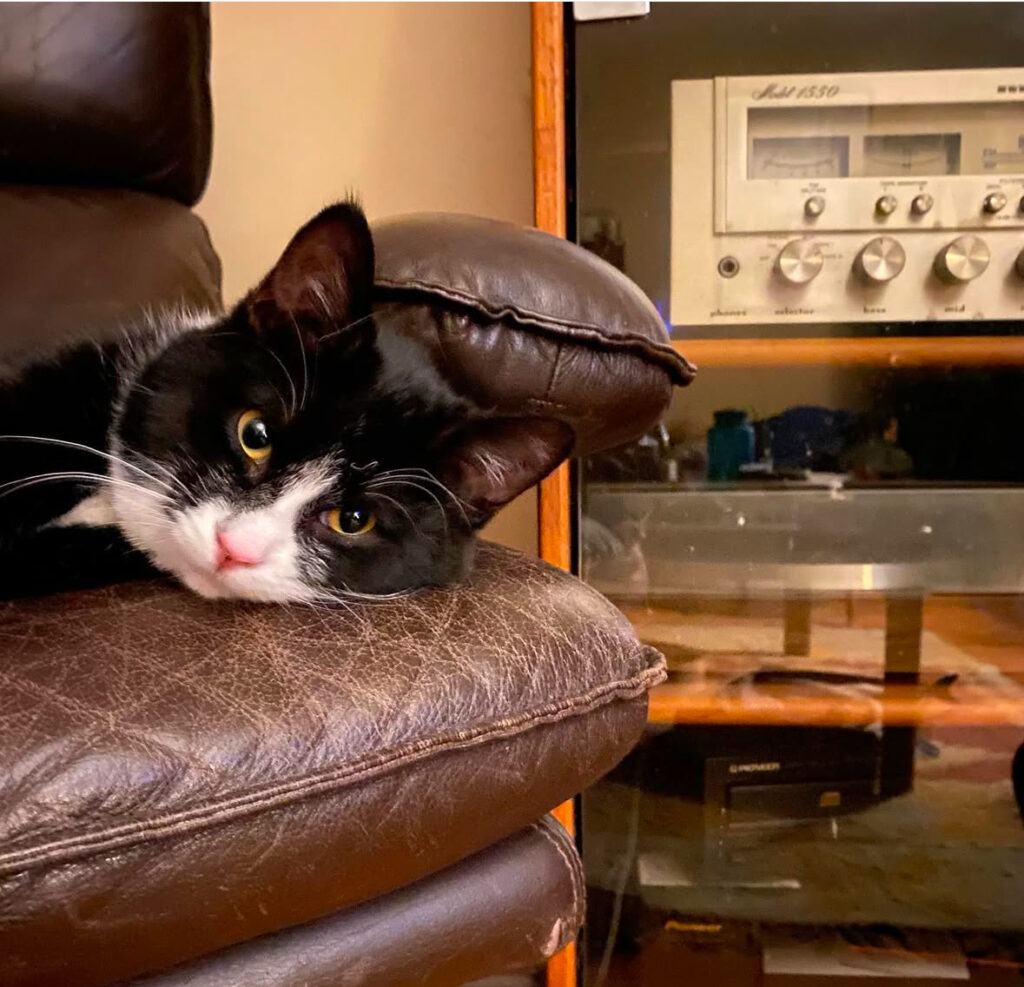
But returning to the question, I like the expression dead media objects as it captures something about the fact that a lot of these objects have lost or seen their cultural capital change with time. It was not that many years ago where we all watched Sopranos on DVD whereas now I think that is much more limited to a dedicated few. One thing it also captures for me is that the objects themselves have to some extent lost their practical value.
For instance, I have been kicking myself for years now for not buying a copy of Brian Eno’s Music for Airports on cassette. It was such a perfect object—I loved the dimensions, the way the art was reduced in that way that tapes (a vertical object) had to figure out a way to fit the square record cover art usually somewhat awkwardly on the front—but also totally useless. I have the album on CD (and possibly on record—been awhile since I checked), and it’s on Spotify and likely YouTube. Why would I want that cassette? But I totally do, and I still think about it all the time.
So for me, dead media objects captures these physical items that were once ubiquitous, now past their prime but still attractive to me. There is a tension I find myself thinking about a lot between these items having artistic and aesthetic merit but always at risk of marking one as an anachronism, which I try to avoid, at least partially and not always with much success.
Years ago, we had a brief discussion of imported menswear magazines, I think specifically Free & Easy or Popeye. You said you used to order them at a Hong Kong magazine shop in Toronto; I wondered then and wonder still whether the shop closed, or its selection changed, or you simply moved on in the circumstances of your life. When you post ephemeral stories to social media, do you consider their impermanence a kind of tribute to the vanishing artifacts of the past?
So the story behind this is a fun one. Toronto and its various suburbs and metropolitan neighbours are very much multicultural and constantly in flux. One example of this is Pacific Mall in nearby Richmond Hill, which serves the ex-pat Hong Kong and Chinese communities. Buried at the edge of its food court with the various hand-made noodle and dumpling shops was a Cantonese / Mandarin book and magazine shop.
The woman who ran it did not generally stock Japanese magazines, but on a hunch, I asked if she could get Free & Easy, Lightning, Brutus, Fudge and the like, and it turned out she could. We then made a deal in which she would order new issues for me, and I would show up every other month or so, and then buy a pile of them. They were not cheap however and at a certain point, I had enough issues to make furniture stacks from the piles, so I had to stop. Sadly, that shop is no longer around. I suspect that she retired, closed the shop and moved back to Hong Kong, which is where her children were living, so she could be with her grandchildren.
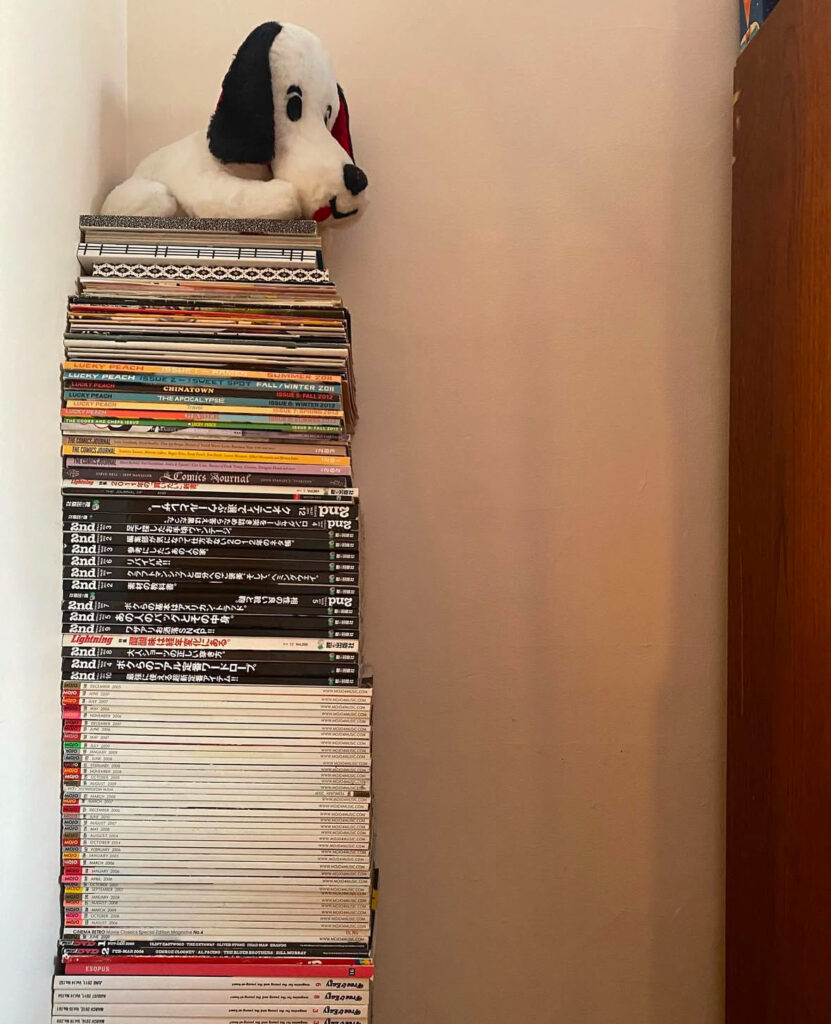
Those magazines played a major role in establishing my taste in style, which definitely gravitates towards older men’s style based on mostly American and British sensibilities, which of course it takes someone who does not live in either country to reduce to their essentials.
This led me down a thread of thought about what American and British sensibilities in their turn have done with the culinary products of—you know what, never mind. The question I actually want to ask is about your username, which is to say, what qualities do you think are of chief importance to a perfect sandwich?
So actually, for the first few years of my account, it was called @Andrew_in_TO. I moved to Hamilton though making the name a bit misleading. A friend used to tease me about it, so I decided to change it to its current @tuna_salad_on_white, which with the benefit was a much better name. Of course, I now get called Tuna all the time, which mystifies my irl friends (those who know I have an online presence anyway).
As for sandwiches, I love them, but I actually do not think I make a very good tuna salad! Left to my own devices, I’m generally a cheese, tomato and feta guy with lots of mayo on sourdough. If however I am out and about, tuna salad is my go-to. I have little patience for huge, too hefty sandwiches, and tuna salad on boring, non-exciting bread is a reliable, comfortable fave.

You have mentioned that at different points in your rakish past you maintained both a blog and a zine, two media which had their moments of mainstream ascendancy and have since been largely dismissed even though their respective subcultures refuse to die. So what were you going to call your podcast?
Like most people, I am defined by my contradictions, which in my case include the warring tension between my desire to be left alone to pursue my passions in private away from bother (reading novels and watching movies does generally require locking the smartphone away) and my love for communicating with others who share my passions (or at least tolerate my nonsense by keeping their negative opinions to themselves).
In short, it is really hard not to care as deeply about art, aesthetics, culture and all that as I do and not have an outlet for sharing that passion with others. As a kid in high school, I published a few issues of a zine, which consisted mostly of my scribblings (I drew a lot more then), pilfered photocopied art from old movie posters and indie comics, and lengthy reviews on whatever I was obsessed with then—1950s-70s b movies, garage rock and exotica, all things Hong Kong and Japan, and Columbo (not much different than now!). I circulated this among my peer group, who were bewildered by my tastes but did get a laugh from my evident passion. Later in my 20s, I did a blog that was pretty much more of the same, adding some local Toronto content, and while I very much got something from writing it, my audience was entirely bots and bewildered strangers who had found the page by accident. I was shouting in the void, as they say.
Instagram works for me, though I think I use it differently than most people, as I basically just treat it as a blog or zine and exploit the fact that people follow me out of a perverse sense of social obligation to have a ready audience.
Regarding podcasts, you’ll never find me there. To refer to the work of a fellow Canuck, in Marshall McLuhan’s terms, I am a cold media guy. I like my discourse dispassionate and not especially exciting, with a definite preference for the written word (with some visuals for illustration). I recoil from the podcast / YouTube world of excessive “hot takes”, exaggerated facial expressions, and loud voices. If more podcasts felt like a BBC broadcast, I might feel differently.
Now see, this is such an interesting note because my acquaintance with you up to this point has been visual-first, text-second. I enjoy the dry urbanity of your Instagram captions, but of course those are only for grid posts! I find your stories more like a wordless collage, with images composed in linear sequence rather than two-dimensional juxtaposition. Do you have a guiding principle for how you order them, or is it more intuitive?
The story posts are pure id. I try not to overthink them, though there is usually a bit of logic in that I try to get something in there that is vaguely ivy / trad / menswear-ish, some retro culture / Hollywood, a chiseled ab or two, definitely some cluttered interiors, and a cheeky shot or two because life is short, and the human body is refreshing. Of course, if I had any real impulse control, I would show some restraint and cut that off after 3-4 pics, but by the time I am done, my stories are running 20+ posts long—which even I roll my eyes about. I just hope that my friends enjoy the ride, drop a comment or two, and find some inspo in the posts that work for me.
The tone of this email, which I hope comes across as affably caffeinated and not just unnecessarily combative, was spurred on by the stimulative effects of my favorite frou-frou coffee drink, called the Fireside Latte because it includes a spoonful of lapsang souchong syrup and a sprinkle of smoked salt on the foam. What is the closest beverage to you as you read this, and should I capitalize “lapsang souchong” as part of my house style or not?
That Fireside Latte sounds delicious!
In my older, wilder days, it would have been a very crisp gin martini with French vermouth and a twist (well, not at 8:00 am—I was never that wild). These days, it is coffee in the morning (stove top moka during the week; French press or pour-over on weekends), sparkling water during the day and maybe Earl Grey or Sleepy Time at night.

Oh right, the whole impetus for emailing you was to ask about how you collect, store, and organize your visual materials for inspiration and review. Also, what’s up with this photo you posted and this bizarrely similar, more slapdash iteration of the same concept I photographed twelve years ago? Like, what? Why? Is this a thing??
That image cracked me up, and to see that you have encountered a similar model cracks me up. That brings me as much pleasure as someone spray-painting the word Porsche on the side of a Ford Tempo.


Back when I first got my own computer (an Apple G4—I had high hopes then of possibly exploring a career as a graphic designer), I systematically set about acquiring a deep library of mood board images (mostly old hardboiled novel cover art and the paintings of Toshio Saeki) mainly as Apple had this great feature where it would turn saved photos into a cycling screensaver.
In later years, I became obsessed with a blog that prefigured both Tumblr and Instagram—If Charlie Parker Was a Gunslinger. It was basically a mood board site that got updated daily with anything and everything the bloggers who contributed were obsessed with, everything from pics of various artists and writers and film directors to screen shots to fine art to comic book panels to you name it, and it was meticulously indexed, which made for endless scrolling.
A lot of the time, I had no idea who the people were who were pictured, but I would look them up and then explore, so it had a lot to do my burgeoning tastes.
Since then, I have always maintained an active folder of pics that hit that just right button for me of cultural interest, aesthetic perfection, erotic potential, or dada-esque irrational hilarity. Of course, I have a recurring problem of cats wrecking my external hard-drives by knocking them over, forcing me to start all over again, but that’s half the fun.
I abhor all forms of organization, which means anytime I am looking for a book on the shelf or a saved pic on my computer, it’s a real journey, and half the time I forget what I was looking for as I find something else that distracts me.
So I feel I should ask a question in response to this (being only fair)–what led to your interest in this area? I always find it interesting how people’s tastes develop and what acts as the initial trigger.
At 43, I sometimes feel like I’m just beginning to develop taste, but I mean that in a net positive way. One of my favorite anecdotes is about David Letterman calling “Everlong” his favorite song, which doesn’t seem odd until you do the math and realize that it came out when he was 50 years old. How unusual and open to the world one must be to find one’s favorite song after you turn 25, much less while recovering from heart surgery in middle age! Another of my favorite anecdotes is about the time my friend Mike, feeling a little exasperated with me, laid me bare by saying “when Brendan acquires a taste, he feels that the world has defeated him.”
To the latter point, an ex of mine used to get very weary of my complete disregard for dressing myself in anything but t-shirts and ragged cargo pants. Because I can be pretty mulish, it was only after we broke up that I allowed myself to furtively google “how to wear clothes adult man” and came across Put This On. That led me to Derek Guy, back in the days before he was a social media phenomenon, and he in turn tipped me off to the aesthetics of Popeye, Akamine Yukio, Brut Archives, David Marx’s Ametora, Emilie Casiez (and thereby the beautifully unhinged captions of Nigel Cabourn), FRUiTS, Wooden Sleepers, etc etc.
That list might make it sound like I am constantly getting off choice fits when the reality is that I have worked from home for five years and almost never wear a belt. But I suppose the takeaway is that RSS feeds in the declining era of the fashion blog allowed me at last to consider self-cultivation as a project I could pursue.
Wait, strike everything I said earlier. Now that I think about it, the actual seed of all my interest in the audible, visual and physical—many years though it took to germinate—was Hackers (1995), costume design by Roger Burton, my favorite movie for almost 30 years.
I certainly did not grow up organically knowing any of this stuff. I was a skater teen and grew up versed in the fashion rules of that set. Later that shifted to dressing like a slightly nerdy britpop / indie rock guy (big shock I know). I suspect that it was in my 20s that I systematically began trying to make some sense of how to dress better and looking things up online. That started as more of a post-mod Britpop thing (lots of Fred Perry and Ben Sherman and parkas and all that) before transitioning into ivy, button downs and khakis that didn’t strangle my thighs. That meant a lot of time on message boards, which was great for learning things and also for realizing that I have zero patience for bizarre online troll wars. At a certain point, I just stopped posting things myself and just lurked for the good intel so as to avoid all that other weird, unhealthy online behaviour.
Put This On came late in the game for me. I had already mostly figured out my game by then, but it was a welcome discovery. First, the writing on that and Derek Guy’s solo Die, Workwear! blog was among the best writing on menswear to be found anywhere. I grew up reading GQ and Esquire, and while I still read those magazines, their advice is often dead-on-arrival, being a mix of extremely au courant fashion updates or very blatant advertorial to sell clothes, which I get since the bottom fell out of magazines long ago (they still both publish great features though, so I don’t sleep on them). Second, I am also fanatical about Ryan Smith and Dick Carroll’s comic strips.
Of course, Die, Workwear! deserves credit for interviewing Yukio Akamine, who gave the best advice on menswear I have ever read: “You don’t have to read fashion magazines. Open the window and look outside when you wake up in the morning. A man who can cook rice is a hundred times cooler.”
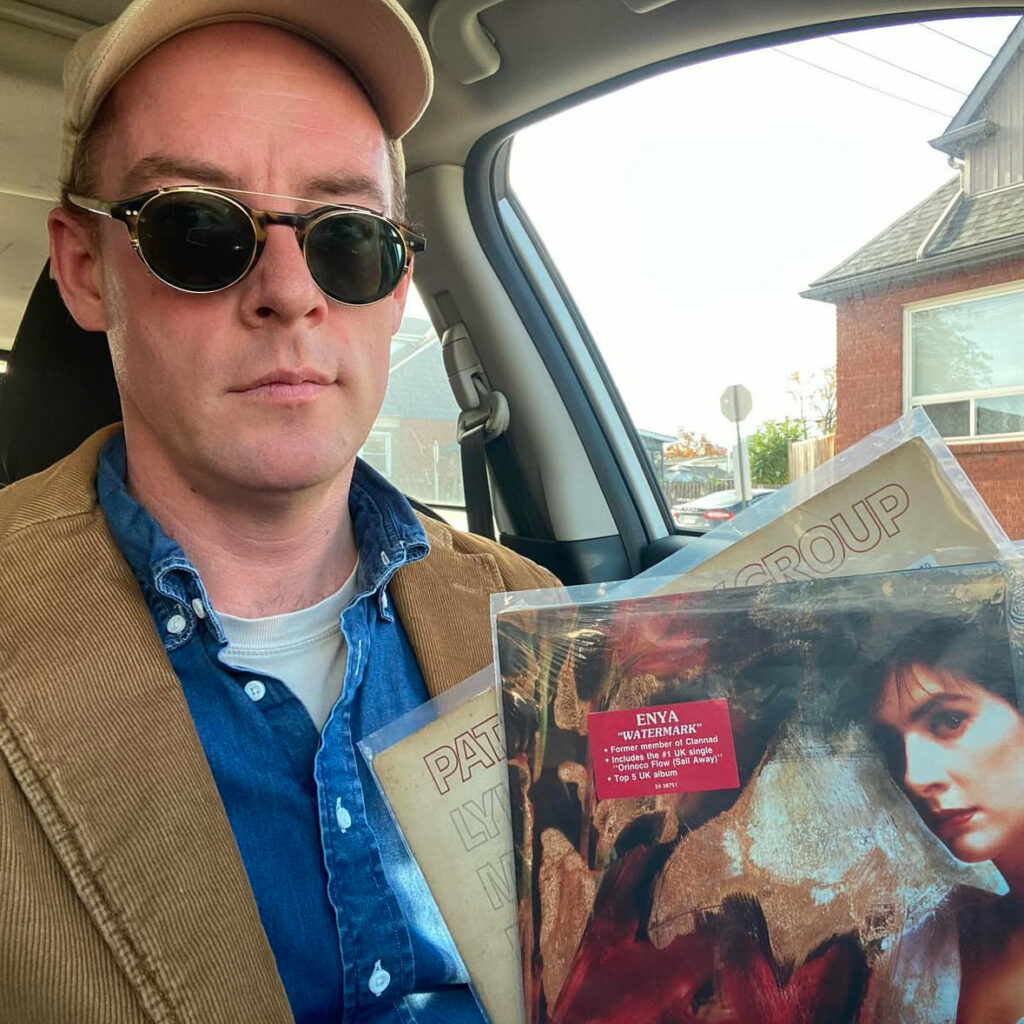

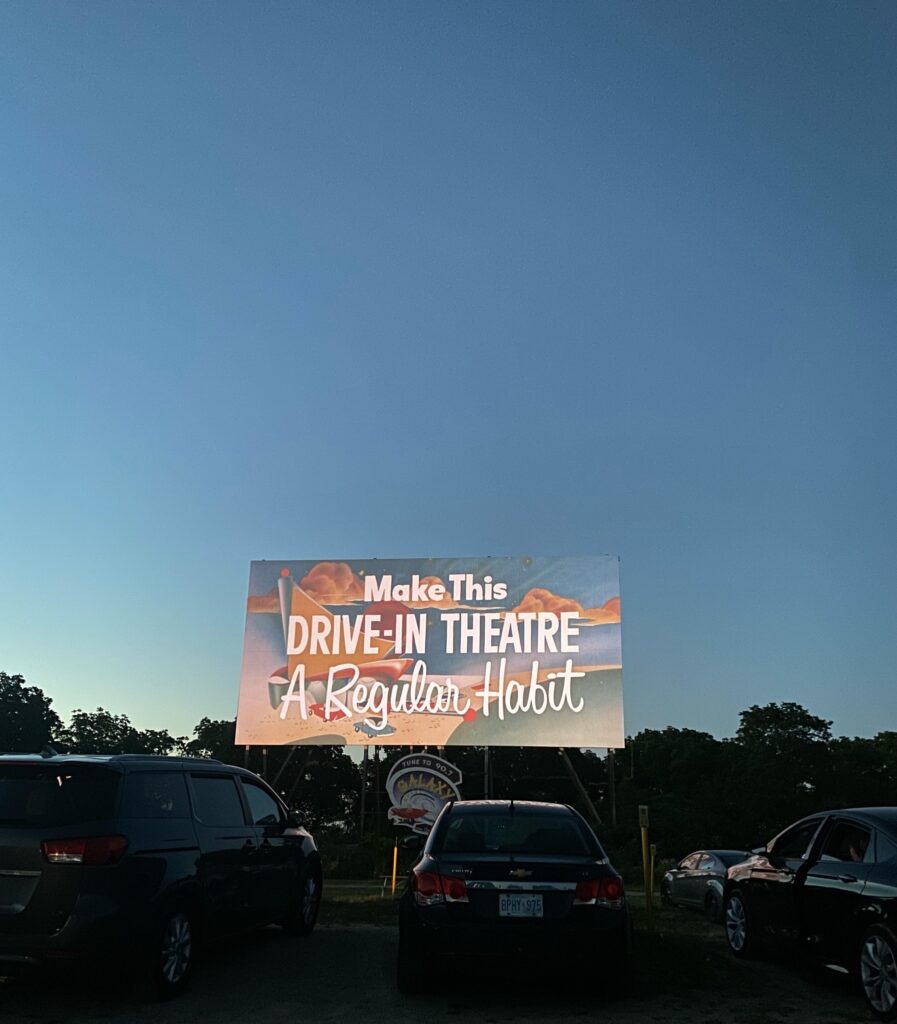
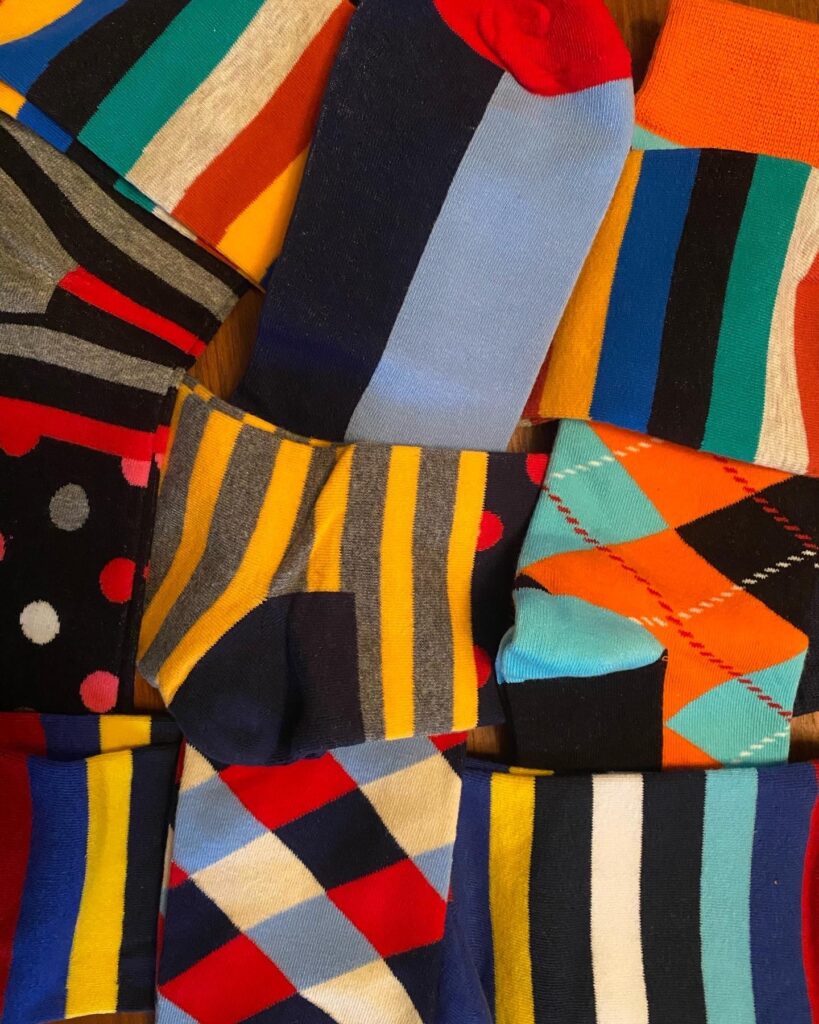
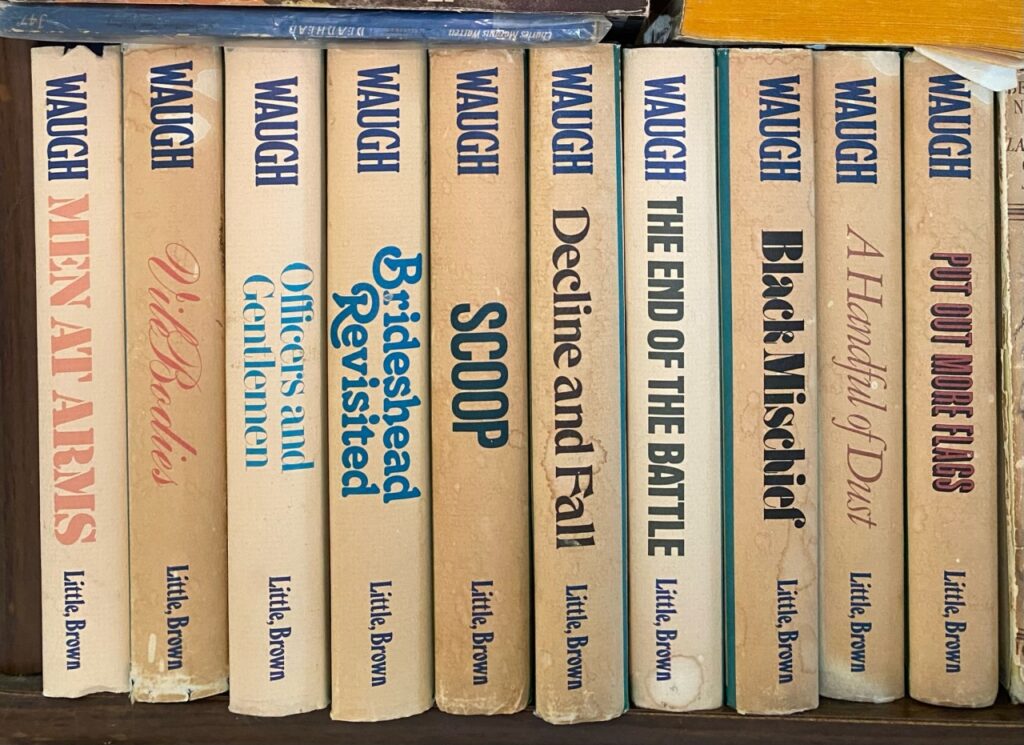
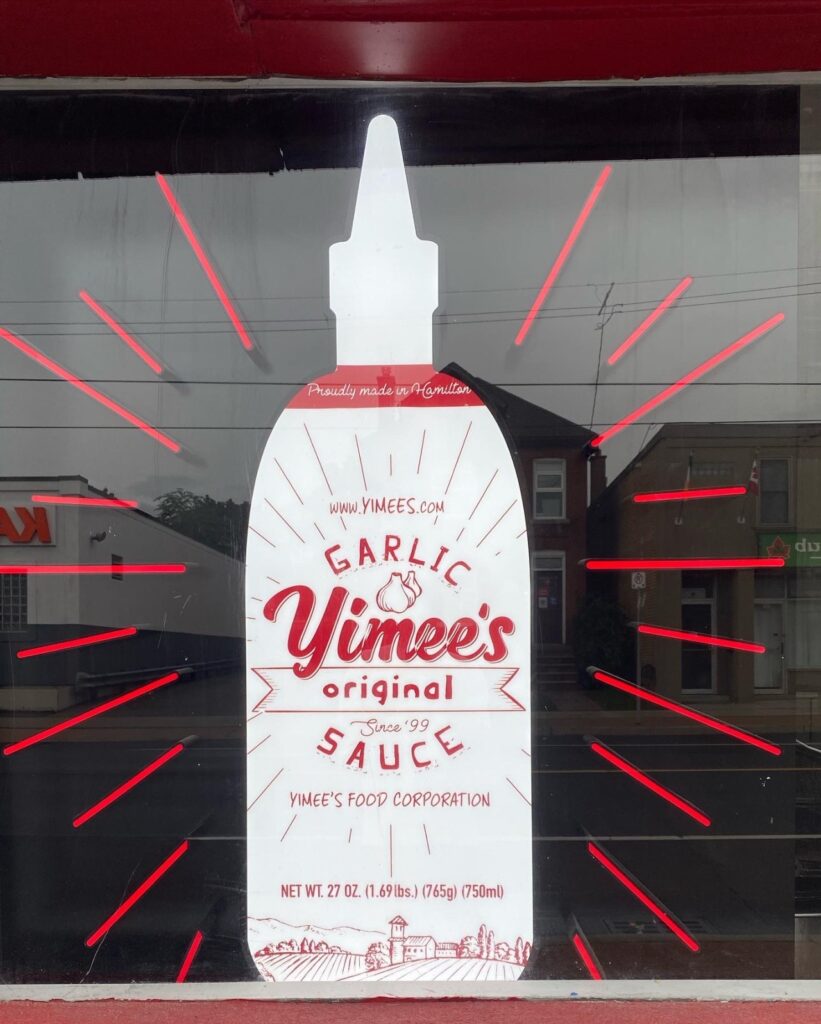

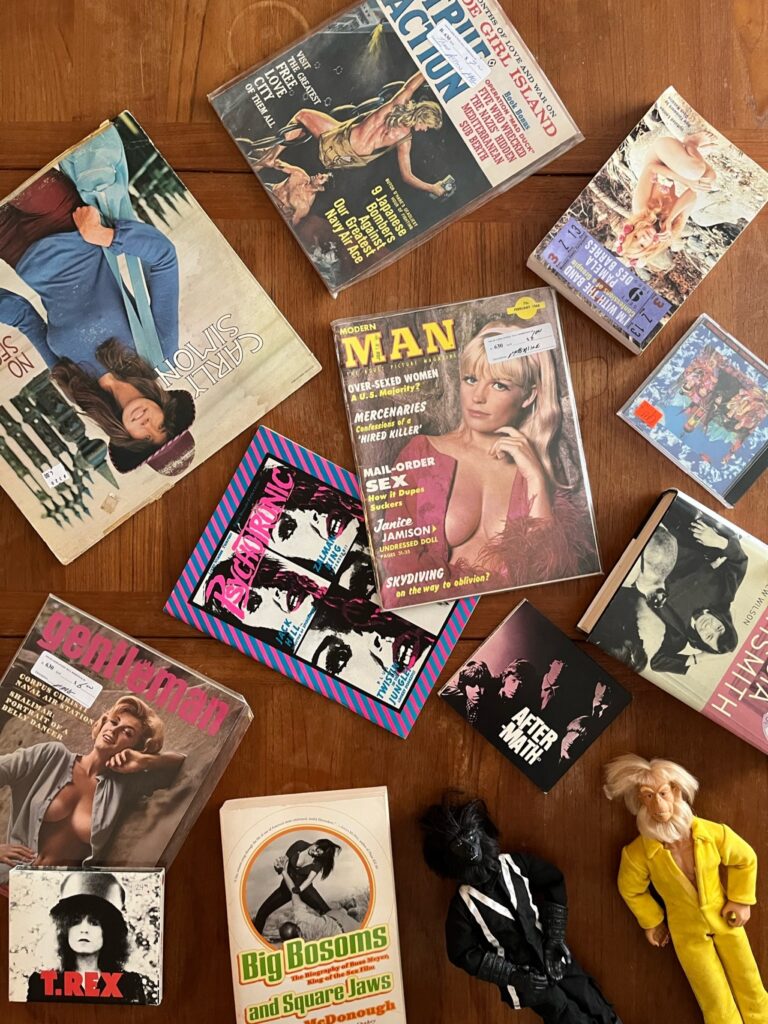
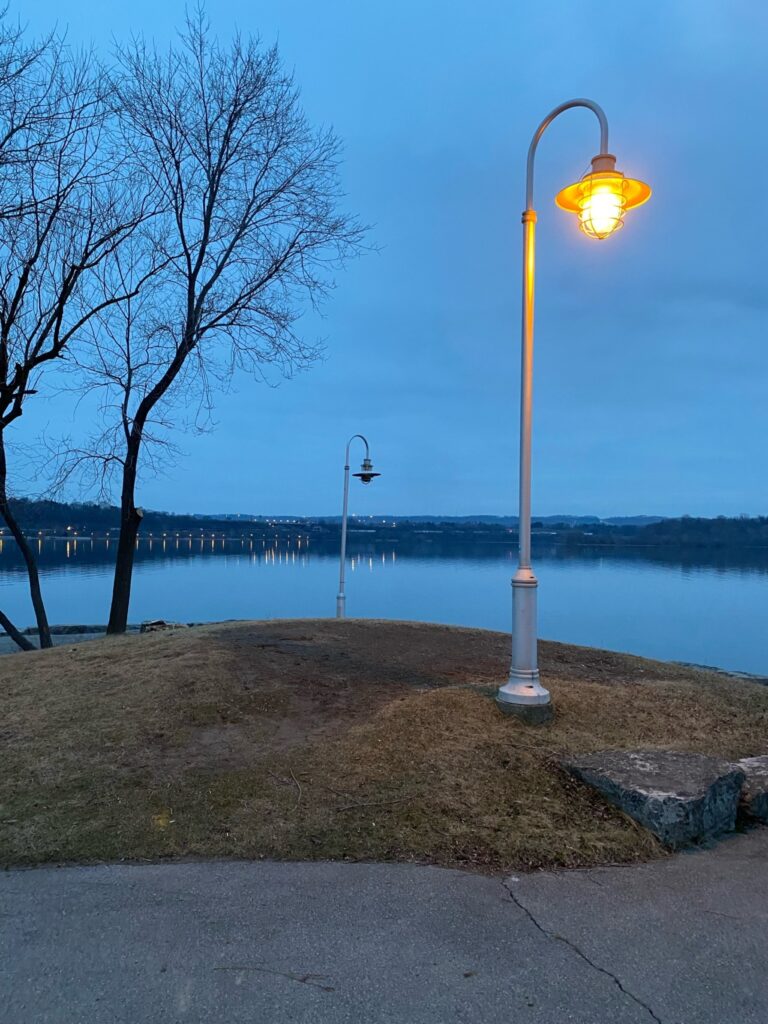

Things I have enjoyed of late
A lot of these are on YouTube, so if you are not a fan of YouTube, you should skip those. But it’s a hard world out there, and videos are some of the things that help divert me from ruminating on matters I can’t control.
- For instance, Tico and his Man are a beautiful example of what can emerge from surrendering to inspiration and letting an enigmatic artist follow his unknowable muse, especially if that artist is a parrot.
- I also feel a great freedom in having given up on Connections and replaced it in my mornings with friendlier puzzles. Cine2Nerdle has possibly the worst Wordle-derived name anyone has yet produced, but it does exactly what I wanted from Connections in terms of interface and hinting, and it’s about movies! (Don’t even talk to me about Cinematrix, I can’t stand it.)
- The NYT web games team can still do good work, though. Strands has actual hints that can be earned through play (not that they’re often necessary—its challenge level varies, but tips toward the easier side). But the first few minutes of looking at a new day’s grid, waiting for my pattern-recognition neurons to wake up, are a consistent if brief instruction in patience.
- But back to videos. I found Brad the Tech Time Traveller’s channel algorithmically—I think his literally-bricked hard drive documentary was what first caught my attention. I love to wind down in the evening by watching him work, and he also has a blog which ably demonstrates his time-travel credentials by skillful use of a <marquee> tag.
- I’ve played a number of games set in the milieu of the Romance of the Three Kingdoms, but I’ve never actually read the original novel. I could just try that—the work is very much in the public domain—but these days I find it easier to digest fiction via audio. So when I want to occupy one hemisphere of my brain with Minecraft, I occupy the other with the podcast that motivated me to make this post in the first place. John Zhu originally started his Romance of the Three Kingdoms Podcast a decade ago, going through the book chapter by chapter in a kind of ongoing summation abetted by his own commentary and context. I find his work so charming and affable, and generous with explanations for a naive audience member like myself. Zhu has gone on to cover other works of similar import under the umbrella of The Chinese Lore Podcast. I’m almost a quarter of the way through the 174 (!) episodes of the original, so I’m very glad there will be more to listen to when I get through all of those.
- Oh, also I still play Minecraft (and of course I still watch Joe). I got back into the game when my nieces and nephews became interested, and then they got kind of bored of trying to coordinate with me long-distance. I kept playing anyway. I can’t play it with joysticks at all, which rules out my Switch, and my laptop is a little unwieldy for games, so I’ve been playing the Bedrock version of the game on my tablet with a bluetooth mouse. I miss being able to mod the Java version but I don’t miss having to sit at a desk to play it. I have a nice little world going now, featuring such wonders as a villager who sells mending books and also a square chunk hole that I dug one block at a time from a mountaintop to the bottom of the world. It’s just a solo local file, but if you are a friend who would like to play in it, email me and I will click the button that makes it a server.
- This is becoming more about video games than I expected. I can’t play Minecraft on our elliptical, so to occupy that version of my brain, I use a secondhand tiny piracy machine to play a randomized version of Final Fantasy III (6) called Worlds Collide. It’s promoted mostly as a racing game—the community holds regular tournaments where competitors all start with the same seed and try to be the first to beat the final boss. I have played through probably twenty times now and I must accept that I will never, ever be fast enough to compete in even the introductory qualifiers. But the scope of the game and my own teenage familiarity with it are juuust right to make it a fun puzzle with many possible solutions every time.
- Let’s go back to the part where I’m bad at reading books! It took me an undisclosed amount of time to finish Roaming, because at first its illustrations of youthful personality interplay were too acute. But I barreled through the back half and loved it, as I do everything by either of the Tamaki cousins. I was spurred on in no small part by the chance to participate in my first ever Zoom-based book club meeting, a privilege of my subscription to Sophie’s wonderful newsletter. It was a treat! Sophie always has excellent book recommendations, and has since motivated me to get my heart broken by a whole different graphic novel.
- And speaking of paid subscription privileges, ACHEWOOD IS BACK, BABY.

- I made the above visual goof in a few minutes on my phone with Mematic, which is kind of a silly app to pay for given how much image-editing software I already own. But I like how easily it allows me to make little jokes to show my friends in small amounts of time.
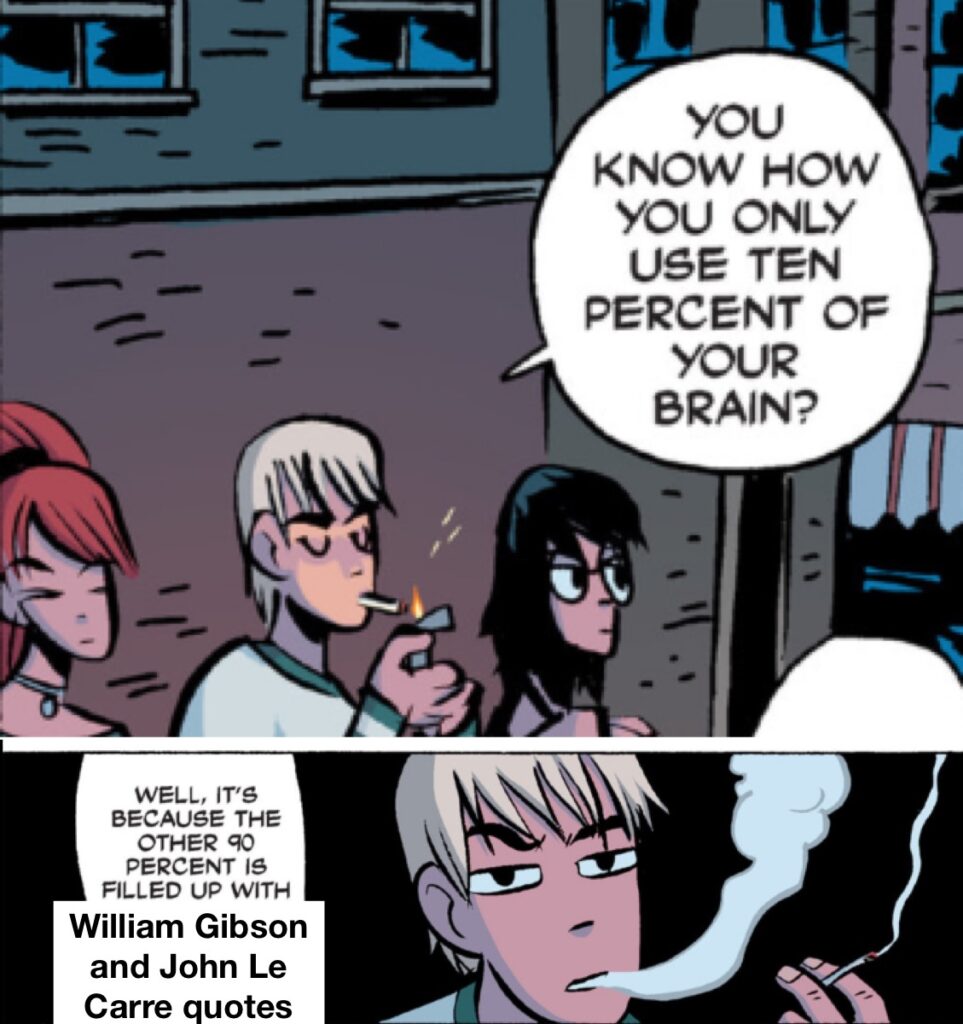
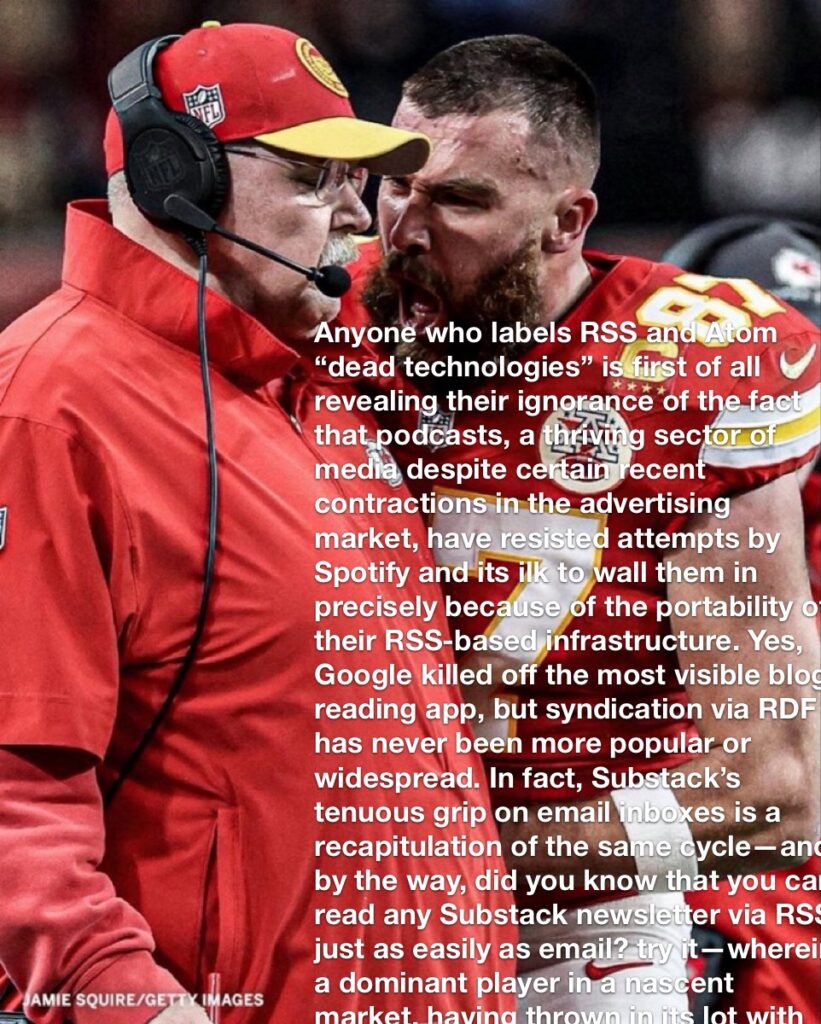
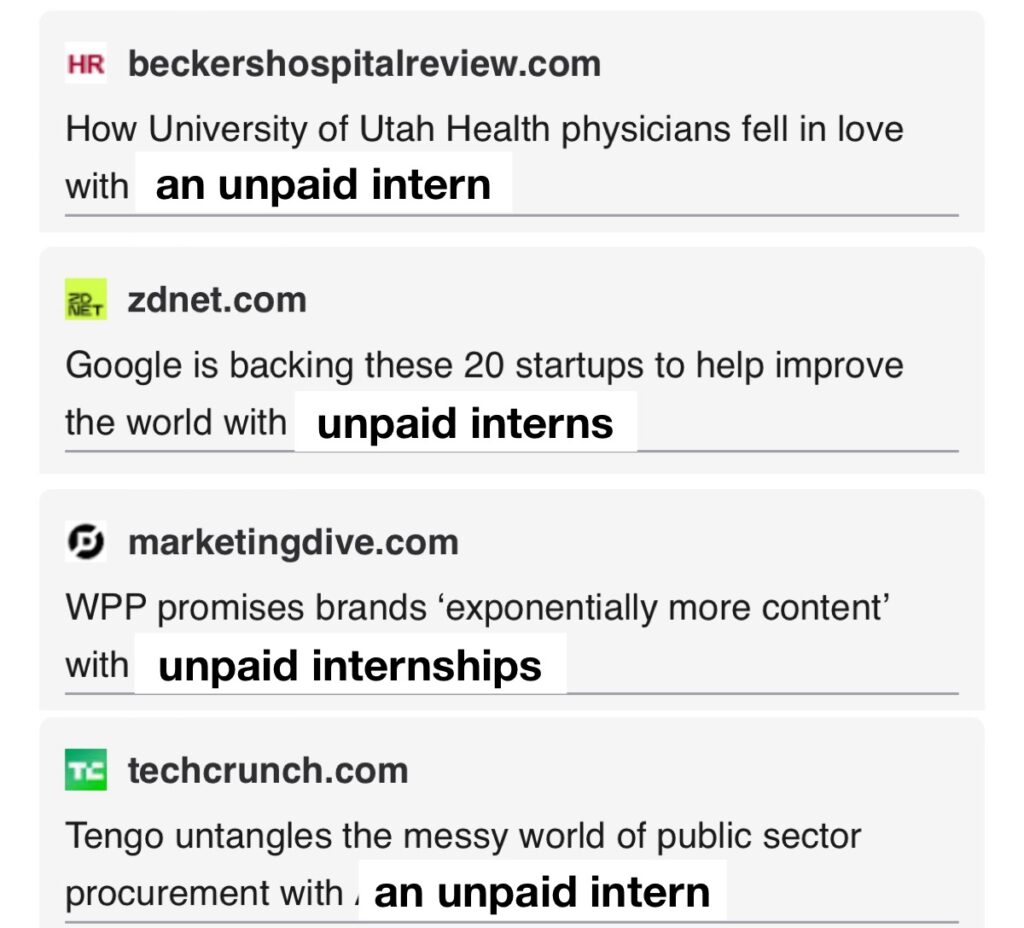
- I loved getting to see Lucy’s collections of studio dances!
- I continue to enjoy, above all else, being married to Kat.

- There’s just one more YouTube link left in this blog post. But I promise I saved it for last for good reason.
It is impossible to disentangle what I want to put here from twitter even though twitter isn’t really what this is about.
“Feel free to adopt the sceptical raised eyebrow, but keep an open mind behind it. When a sceptic becomes a cynic it turns them sour.”
“I would argue that it isn’t technology that is at the root of our anemoia.”
“I believe soon the answer to the question “Can a computer write poetry?” will be “yes, of course,” for most casual observers. I’m going to take this assertion one step further and make a stronger claim: in fact, the only thing computers can write is poetry.”
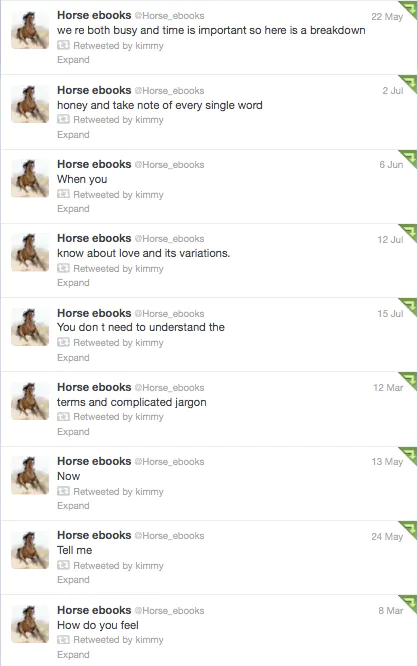
Kimmy Walters after Horse ebooks, 2012
“There’s a Chinese phrase for when you lose money on something that translates to ‘paying school fees.’ I’ve paid a lot of school fees, and I don’t consider any of it wasted money. Even through the mistakes, I’ve learned a lot.”
I had to go searching for a third quote just so I could legally post the first two
“Websites are not similar to telephones. They are not even similar to books or magazines. They are street corners, they are billboards, they are parks, they are shopping malls, they are spaces where people congregate.”
—Ryan Broderick
“It now feels like we live in a cyberspace dominated by skyscrapers instead of neighborhoods.”
—Jody Serrano
“I used to see my job as teaching students, hey, the Internet might seem great, but it has all these sort of hidden power dynamics that are troubling, and we should learn about those. And now my job is very different. Now my job is to show students that it wasn’t always this way online, and that means it could also be different in the future.”
—Jessa Lingel
“Ancient Romans didn’t accidentally set off fireballs every time they had a conversation.”
I started a tinyletter for recommending youtube channels two and a half years ago but then I was like, wait, I have a blog
If you are one of the six people who signed up for said tinyletter then I am sorry I never sent a second emission from it; I might still use it someday. (The same goes for my neglected dreamwidth account.) But I feel like I’ve got a little writing momentum here on NFD and I’d like to keep that up for a minute. So here’s a plug for an incomprehensibly deep dive into video games that I didn’t even really like that much when they were the only ones I had!
There are a lot of white dudes who like to talk about old nerd media in videos on the Internet, but mostly what they do is offer their own opinions, at best seasoned with a little intro lifted from Wikipedia. I find it hard to spend minutes of my one precious life absorbing those opinions. I have too many opinions already. What I value, instead, is the dudes who can explain and explore something I don’t understand in a way that makes me feel like I do understand it (although I very much still don’t).
This is why I subscribe to a channel with the mildly concering name of Displaced Gamers, which is not about gamers or being displaced. It’s a series of exegeses on the assembly code that composes old video games, mostly NES games, and the startling things that tiny changes in that code can bring about. I myself could not read assembly code if my life were at stake, but the channel creator’s steady, patient narration helps me feel like I can almost follow along in real time. I’m thinking in particular of these most recent two videos, about how and why one can glitch into unplanned memory areas in Super Mario Bros to find the apocryphal Minus World…
… And then discovering 256 completely new Minus Worlds in the Super Mario All-Stars iteration of the game, using only three Game Genie Codes. (!)
It’s that last bit that really gets me. I had a Game Genie for our Super Nintendo when I was young, and I made heavy use of it, which is to say that I never got to be good at video games. I never had a solid grasp on the device’s methods of operation or how to explore a game’s code with it. I was not, as noted above, an ardent Mario fan (I preferred Mario Kart and the RPG spinoffs) though I respect the ground the games broke and their own interesting design constraints. But this particular video essayist earns my attention not only because he’s doing original research in the history of software—a field which, I will keep shouting forever, is ahistorical to the ongoing detriment of the entire world—but because he keeps at the work until he can fit his proof of concept into the “you can do this with your own Game Genie” constraint. That’s powerful Brendan-bait.
A Walkable Internet
Sometimes I think that popular media’s fascination with counterintuitive propositions is a big contributor to what got us into this mess. I use the word “media” there to mean more than just major publications, but we’ll get to that later. Also, sometimes, I like to think up counterintuitive propositions myself, like software doesn’t mean “code,” it means “a system for consolidating control of the means of production.” Or maybe the Internet can be defined as “that which will promise you what you want.”
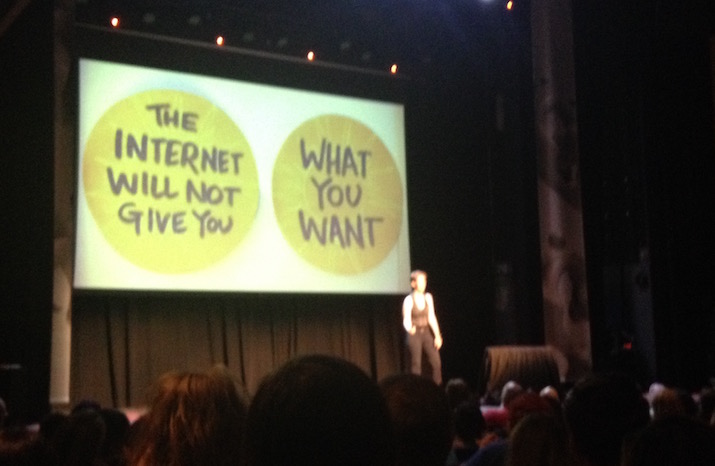 Photo by Stefan Shepherd from Lucy’s extraordinary September 2016 talk, which I think about at least every other day.
Photo by Stefan Shepherd from Lucy’s extraordinary September 2016 talk, which I think about at least every other day.
I don’t offer these takes with any intent to defend them. I just think they’re useful mental calisthenics, valuable as alternative modes of thought to the definitions that creep into common idiomatic use: things like the Internet can be defined as “the most active population of large social media platforms.” I certainly use that shorthand myself, often in a scornful tone, despite my own attempts to stretch the popular conception of the Internet around the deconglomerated approaches that people these days call “IndieWeb.” One of the writers I admire, and linked to back in March when talking about this stuff, is Derek Guy of Die, Workwear and Put This On. Sometimes I sneak onto Twitter to see his dorky fashion memes, and today I discovered this, one of his more popular tweets of late. It has, as of this writing, numbers underneath it that far exceed its author’s follower count.
the older i get, the more i realize that the most luxurious thing is being able to live in a walkable city. wearing a nice little outfit and walking 15 mins to buy just enough groceries for a single dinner will make you feel like Mrs. Dalloway going to the market
— derek guy (@dieworkwear) June 29, 2022
This is a gentle proposition, almost to the point of being anodyne. Maybe you disagree with it. I happen to agree, myself, as someone who has spent a number of years enjoying such a lifestyle; I agree in particular that it is luxurious, which is to say a luxury. One way I define luxury is an ephemeral privilege not to be taken for granted. Many people are systematically deprived of the privilege of walkability by the way that capital and its frequent servant, municipal policy, prioritize car travel and inherited wealth to create housing insecurity and food deserts. To me, that understanding seems built into the way these two sentences are constructed.
Three days after it was posted, I can sit here and watch the retweet and quote numbers on the post tick upward every time I breathe. I don’t think that’s due to positive attention.
twitter: touch grass
me: *goes outside to touch grass*
twitter: you ever consider people who don’t even have grass to touch? you idiot. you asshole. you absolute piece of shit.
— derek guy (@dieworkwear) June 30, 2022
i cant overstate how bad the internet has gotten in the last ~6 years. while there have always been dark places on the net, there used to be some level of good-natured camaraderie in specific circles. now every space feels primed for argument and bickering.
— derek guy (@dieworkwear) June 30, 2022
I’m not here to write about how Twitter Is Bad. Even Twitter, as a body, agrees that Twitter Is Bad. I’ve written variations on that theme for ten years as of next month, and I can’t declare myself piously abstemious from social media when I’m quoting social media posts in my post about social media. The interests of capital demand that Twitter makes its graph lines go up; the simplest mechanism to make them go up is to incentivize conflict; the capital circulates through organizations until the system’s design iterates toward conflict optimization. Primed for bickering, just as the man says. The story of social media is the story of how billionaires made other people figure out how they could extract money from the late-twentieth-century invention of the real-time flame war.
I just feel bad for Guy because I like his work and have a bit of a parasocial relationship with him: he is, more or less, the person who taught me how to enjoy shopping and wearing clothes. (I know many other people are subject to worse for less online, every day. I mean it when I say it’s Bad out there.) If not for Die, Workwear, I don’t think I would ever have chosen to take this series of self-portraits, a couple years back, wearing things I bought and liked just for myself.
I posted those photos on Flickr, even though I have my own IndieWeb site where I can host as many photos as I want. Flickr is a social media platform. It’s a rarity, not in that it did not generate for its acquiring capitalists the graph numbers they wanted, but in that it was then left to molder in neglect instead of being defenestrated for its failure. I have strong disagreements about some recent choices by its current owners, whatever their best intentions. But at least it’s not Instagram. Flickr has, for many years, retained an interface bent toward the humane and curious, instead of capitulating to the wind-tunnel abrasion of those who value human life less than the ascendance of the line on the graph.
Another thing I posted on Flickr, back in 2018, was the set of photos I took with Kat on our trip to Budapest together. One of the places we visited was Szimpla Kert, a romkocsma or “ruin bar,” built almost twenty years ago in what was once the city’s Jewish quarter by people in its neighborhood who wanted to make something new out of something old. It was once a condemned shell of a building; now it’s a huge draw, with thousands of visitors on a given night, most of whom are tourists like us. Locals might disagree, but I did not find that its charm was diminished by the crowd. It was idiosyncratic, vibrant, complex, and unique. Hungary—like my country, and like the Internet—is a more worrisome place to live than it was a few years ago. But Szimpla seems to be thriving, in large part because it is knit tightly into its local community.
“Szimpla Kert” translates to “simple garden.” I have a little experience with the allure of gardening, and also how much work a garden takes to maintain; I’m sure the people running Szimpla work very hard. But an interesting way of looking at a garden, to me, is a space for growth that you can only attempt to control.
In the middle of drafting this increasingly long post, Kat asked me if I wanted to take a walk up to her garden bed, which is part of a community plot a ways to the north of us. I was glad to agree. I helped water the tomatoes and the kale, and ate a sugar snap pea Kat grew herself right off its vine, and on the way back I picked up dinner from our favorite tiny takeout noodle place. It took over an hour to make the full loop and return home, and I was grateful for every step. An unhurried walk was exactly what my summer evening needed. I luxuriated in its languidness, because I could.
When you put something in a wind tunnel, you’re not doing so because you value the languid. I am far from the first person to say that maybe we could use a little more friction in the paths we take to interact with each other online. Friction can be hindering or even damaging, and certainly annoying; I’m not talking about the way we’ve somehow reinvented popup ads as newsletter bugboxes and notification requests. I just want to point out that friction is also how our feet (or assistive devices) interact with the ground. We can’t move ourselves forward without it.
It’s a privilege to have the skills, money, time and wherewithal to garden. You need all those kinds of privilege to run your own website, too. I think social media platforms sold us on the idea that they were making that privilege more equitable—that reducing friction was the same thing as increasing access. I don’t buy that anymore. I don’t want the path between my house and the noodle restaurant to be a conveyor belt or a water slide; I just want an urban design that means it’s not too far from me, with level pavement and curb cuts and some streets closed to cars on the way. I want a neighborhood that values its residents and itself.
This is why I’m as just interested in edifices like Szimpla Kert and Flickr as I am in the tildeverse and social CMS plugins and building the IndieWeb anew. Portland is the most walkable city I’ve lived in, and it ended up that way kind of by accident: the founders optimized for extra corner lots out of capitalist greed, but the emergent effect was a porous grid that leaves more space for walkers and wheelchairs and buses and bikes. The street finds its own uses for things, and people find their own uses for the street. Sometimes people close a street to traffic, at least for a little while. And sometimes people grow things there.
I don’t expect the Internet we know will ever stop pumping out accelerants for flame wars directed at people who just felt like saying something nice about a walk to the grocery store. That paradigm is working for the owners of the means of production, for now, though it’s also unsustainable in a frightening way. (I will never again look at a seething crowd, online or off, without thinking twice about the word “viral.”) But if someone who lives in Chicago can’t entirely ignore what suburban white people get up to in the Loop on St. Patrick’s Day, then one doesn’t have to go out of one’s way to join in, either.
I’m ready to move on from the Information Superhighway. I don’t even like regular superhighways. The Internet where I want to spend my time and attention is one that considers the pedestrian and unscaled, with well-knit links between the old and the new, with exploration and reclamation of disused spaces, and with affordances built to serve our digital neighbors. I’m willing to walk to get there.
A front-end developer and former colleague I admire once said, in a meeting, “I believe my first responsibility is to the network.” It was a striking statement, and one I have thought about often in the years since. That mode of thought has some solid reasoning behind it, including a finite drag-reduction plan I can support: winnowing redundant HTTP requests increases accessibility for people with limited bandwidth. But it’s also a useful mental calisthenic when applied to one’s own community, physical or digital. Each of us is a knot tying others together. The maintenance of those bonds is a job we can use machines to help with, but it is not a job I think we should cede to any platform whose interests are not our own.
The Internet will promise you what you want, and the Internet will not give it to you. Here I am, on the Internet, promising you that people wielding picnics have put a stop to superhighways before.
 Photo by Diego Jimenez; all rights reserved.
Photo by Diego Jimenez; all rights reserved.
Fifteen years ago this summer, I was exercising a tremendous privilege by living and working in London, in the spare room of an apartment that belonged to friends I met online. They were part of a group that met regularly to walk between subway stations, tracing the tunnel route overground, which they called Tube Walks. There was no purpose to the trips except to get some fresh air, see some things one might not otherwise have seen, and post the photos one took on Flickr.
My five months south of the Thames were my first real experience of a walkable life. I grew up in suburbs, struggled without a car in Louisville, and then, for the first time, discovered a place where I could amble fifteen minutes to the little library, or the great big park, or the neighborhood market, which would sell me just enough groceries for a single dinner. Battersea is not a bourgeois neighborhood, but it’s rich in growth and in history. It changed what I wanted from my life.
London, like Budapest, like Chicago, is a city that has burned down before. People built it back up again, and they didn’t always improve things when they did. But it’s still there, still made up of neighborhoods, still full of old things and new things you could spend a lifetime discovering. And small things, too, growing out of the cracks, just to see how far they can get.
Daniel Burnham, who bears responsibility for much of the shape of post-fire Chicago, claimed inspiration from the city’s motto of Urbs in Horto: that is, City in a Garden. (Which I didn’t even know, myself, until Kat gently pointed it out to me while proofreading this post.) Burnham was also posthumously accorded the famous imperative to “make no little plans.” But I like little plans, defined as the plans I can see myself actually following.
I didn’t know where this post was going where I started it, and now it’s the longest thing I’ve ever published on this blog. If you read the whole thing, then please take a moment of your day and write me to tell me about a website that you make, or that you like, or that you want to exist. I’ll write back. More than ever, I want to reclaim my friendships from the machinery of media, and acknowledge directly the value that you give to my days.
